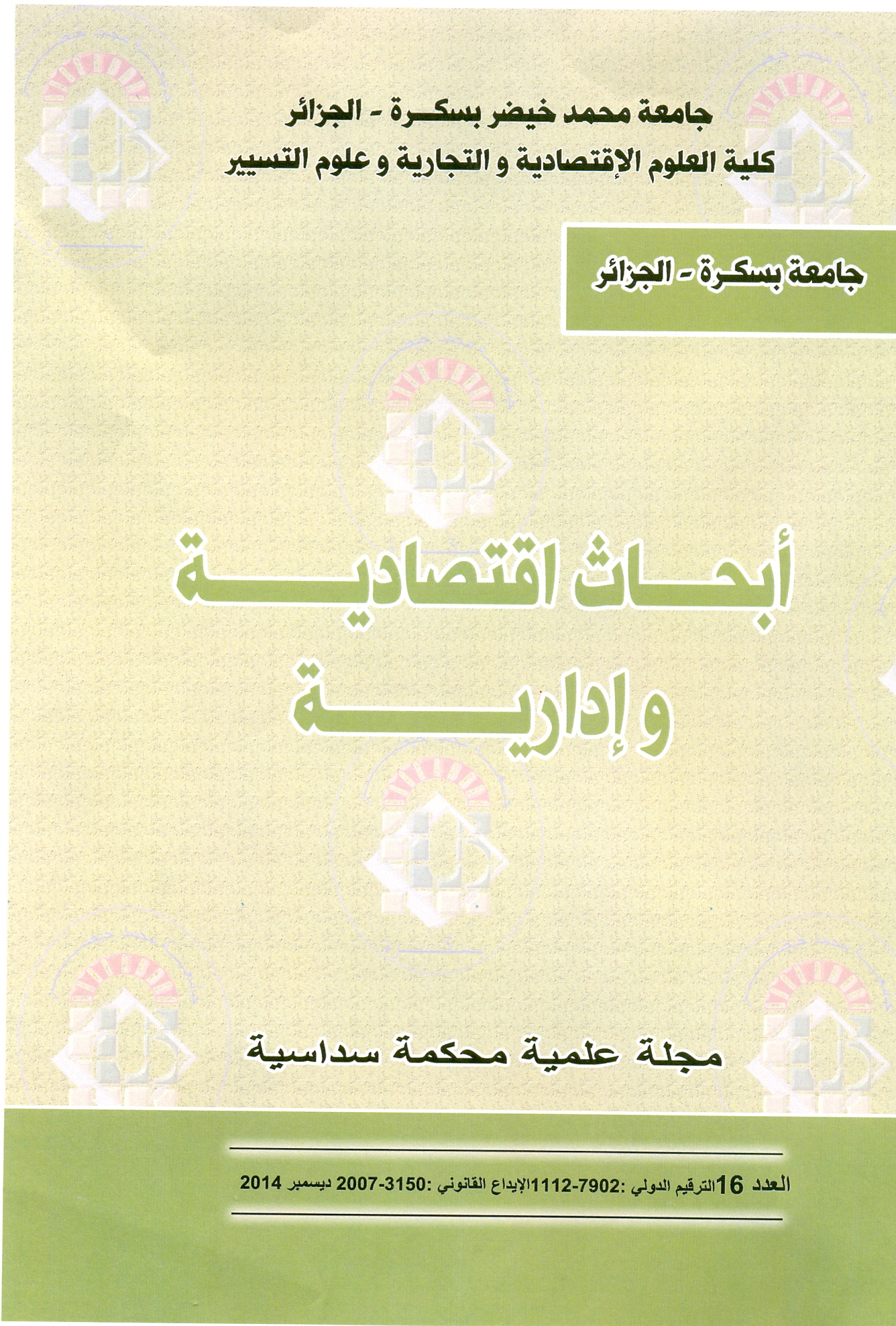نحو نموذج تنموي بديل في الجزائر- دروس من النموذج الياباني –
Résumé
الملخـــص:
في هذا العالم المضطرب و المتأجج بالصراعات أصبح تحقيق تنمية اقتصادية حقيقية إشكالية عويصة تواجه السياسيين عموما و الاقتصاديين خصوصا، و لهذا ارتأينا تقديم هذا البحث الذي يسلط الضوء على وجود جملة من القيم التي تؤطر المجتمعات، حيث تلعب المنظومة القيمية دورا مزدوجا فهي من جهة تتسبب في تكون لحمة اجتماعية و إنسانية قوية تسهل من عملية تقبل المجتمعات لعملية التغيير التنظيمي الرامي إلى إجراء إصلاحات اقتصادية، مقدمة الصالح العام على جملة المصالح الشخصية، و في المقابل يمكن أن تعلب منظومة قيمية معينة دور العائق و حائط الصد أمام جملة الإصلاحات الاقتصادية، حيث تصبح تلك الإصلاحات مساسا بالمكتسبات التي تعكسها تلك المنظومة.
في هذا السياق تمكنت العديد من البلدان الآسيوية من تحقيق تقدم اقتصادي غير مسبوق، و الفضل يعود إلى جملة القيم التي درجت و تربت عليها تلك المجتمعات عموما و المجتمع الياباني خصوصا، و هو ما يستدعي التعرض بالدراسة إلى تلك المنظومة القيمية التي كرست التفوق الياباني، و على العكس من ذلك لعبت منظومة القيم المحدثة و المكرسة في المجتمع الجزائري إبان العهد الاشتراكي وما بعده، دور العائق أمام كل محاولات الإصلاح الاقتصادي.
وأخيرا سنحاول تقديم نموذج تنموي بديل عن ذلك المنتهج حاليا في الجزائر، حيث يكون للقيم مكانها في عملية التغيير و تؤخذ المقاومات و المصالح الخاصة في الحسبان.
الكلمات المفتاحية:تنمية، الجزائر، الآسيوية، القيم، الياباني، تغيير، مقاومة.
Résumé :
Dans ce monde perturbé et agité l’atteinte du développement économique devient une véritable problématique, ce papier focalise la lumière sur les valeurs et le système de valeur qui régissent les sociétés et se concentre sur le fait que ces valeurs peuvent jouer un double rôle, d’un coté ces dernière peuvent facilité la progression économique du fait qu’elle engendre une cohésion sociale et humaine permettant l’acceptation de la société de toutes sortes de changement institutionnel visant la réalisation des réformes économiques, même au détriment des intérêts personnels au profit du bien collectif, en contre partie lesvaleurs propagées dans une sociétés peuvent entraver toutes démarches de réformes économiques .
Dans ce sens, les pays asiatiques deviennent le sujet d’une étude approfondie, afin de découvrir leurs systèmes de valeurs et comment ce dernier a facilité l’émersion de leur miracle économique, d’un autre coté l’étude de l’économie algérienne peut nous éclaircir les contraintes et les obstacles que peuvent dresser les valeurs communes de la société devant le processus des réformes économiques.
Enfin nous essayerons de proposer un model de développement alternatif à celui appliqué aujourd’hui en Algérie.
- Mots clés : Développement, Algérie, Asiatique, valeurs, Japonais, changement, résistance.
Références
- Hirsch, G. et Swierczek, F.W. (1993). "Multicultural Perspectives on Management and Organization : Is there a European or Asian Management ?". European Management Journal, Special Issue EAP 20th Anniversary.
-Whitley, R. (1992). Business Systems in East Asia: Firms, Markets and Societies, London: Sage Publications.
Idem.
و ذلك لكونها كانت تابعة لبريطانيا و لم تستقل عنها إلا في سنة 1997.
-Callon, M. (1989). La science et ses réseaux. Paris : La Découverte.
*-Hakansson, H. et Snehota, I. (1989). "The firm is not an island". Scandinavian Management Journal, N°2.
-Whitley, R. (1991). "The Social Construction of Organizations and Markets : The Comparative Analysis of Business Recipes", pp. 120-143, in Reed, M. and Hughes, M. Rethinking organization. Sage Publications. Présenté par G. Koenig.
- Broucker de, P. (1990). "Le monde vu du Japon". Futuribles, avril, pp. 3-19. Présenté par D. Colon.
-Campbell N.C.G. (1991) "The borderless company: networking in the Japanese multinational". Proceedings of the 7th IMP Conference, Uppsala, Septembre. Présenté par M. Bourqui.
-Cutts, R.L., (1991)."Eastern Europe's troubles open door for Japanese expansion". California Management Review, Printemps, pp. 58-72, Présenté par B. Pras.
- Hirsch, G. et Swierczek, F.W. (1993). OP-cit.
Williamson.O.E.(1991). ‘Comparative Economic Organization: The Analysis of Discrete Structural Alternatives’, Administrative Science Quarterly, 32, 269-296.
-Spender, J.C. (1989). Industrial Recipes. Oxford : basil Blackwell.
*-Whitley, R. (1991).Op-cit.
Graduated from the University of Tokyo with a BA and an MA in economics and earned a Ph.D. in economics from the University of Minnesota in 1967.
• Henri and Tomoye Takahashi Professor Emeritus of Japanese Studies in the Economics Department,
• Senior Fellow of Stanford Institute of Economic Policy Research (SIEPR)
• Freeman Spogli Institute for International Studies (FSI) at Stanford University.
• Director of the Virtual Center for Advanced Studies in Institutions (VCASI) at the Tokyo Foundation.
• President of the International Economic Association (2008~2011) and a former President of the Japanese Economic Association (1995).
• Founding editor of the Journal of Japanese and International Economies.
• He was awarded the Japan Academy Prize in 1990, and the 6th International Schumpeter Prize in 1998.
AOKI.M.(1990).« Toward an Economic Model of The Japanese Firm »,Journal of economic litterature.
وهي البنية التي تعتمد إما على المفاهيم الرأسمالية أو على المفاهيم الاشتراكية في تسيير المؤسسات.
L'ordonnance n°71-74 du 16 novembre 1971 relative à la gestion socialiste des entreprises. Plusieurs décrets mettront en application les dispositions de cette ordonnance (Décret n° 75-149 du 21 novembre 1975, n° 75-150, etc)
4 Journal officiel de la république Algérienne, (JORA) du 13 décembre 1971.
قانون رقم : 78-12 الصادر بتاريخ 5 أوت 1978.
من أجل تحليل قانوني وافي للتسيير الاشتراكي للمؤسسات نستطيع الرجوع إلى كتاب
( BOUSSOUMAH, 1981).
الجريدة الرسمية، القانون الصادر بتاريخ 13/12/1971، ص: 1346.
نفس المرجع السابق. ص:1348.
نفس المرجع السابق.ص:1352.
نفس المرجع السابق.ص:1354.
NORTH. D.C.(1990). "Institutions, Institutional Change and Economic Performance", Cambridge University Press.
التوازن المقصود هنا هو قبول جميع المتعاملين بالتنظيمات السائدة.
Williamson. O. (2000). ‘Economie des institutions’, PUF, P :59.


